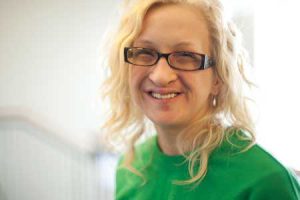
By Rachel Desjourdy
I was born with EEC (Ectrodactyly–ectodermal dysplasia–cleft) a syndrome that, among other things, gave me a cleft lip and palate, and left me with bilateral conductive hearing loss. I have been wearing hearing aids since the age of three years old, and my hearing loss has become an integral part of who I am.
When I tell people that I’m hard of hearing, a common question is “what’s it like being hearing impaired?” Well, what’s it like being hearing? The way I hear has always been the way I hear – I have no set point to compare it to. I’ve adapted strategies that allow me to maximize my abilities, most of them unconscious.
When I first came to McGill in 2010, I didn’t register with the Office for Students with Disabilities (OSD). In high school, I was registered with Student Services, but I rarely asked for help. Rather, if I needed something I talked to my teacher directly.
In a class of about 30 students, where the teacher knows you by name, this was easy to do. But when I got to McGill, I stepped into one of my first science classes and knew that things weren’t going to be the same.
Difficult transition
Suddenly I found myself in a world where my classes were held in large amphitheatrs, with hundreds of other students. Teachers had to use microphones in order to project their voices to the entire audience, and if you wanted to get a seat in the first half of the auditorium, you had to be a keener and show up 15 minutes early to class. To say that my first semester was an adjustment would be an understatement.
I managed to survive my first fall semester before going to the OSD. I didn’t really think that they could help me, but I showed up and made an appointment to see someone.
The reason I was reluctant to go was because I didn’t want to declare myself as a student with a disability, because I don’t feel disabled. I am able to cope and adjust in every other area of my life, and I had been able to manage by myself up until that point. While my transition from high school to CEGEP went seamlessly, I felt that my transition from CEGEP to university was a little rockier. I realized, only later, that a lot of my frustration was caused by a disabling environment; up until that point, my impairment hadn’t stopped me, but in this new environment it had become a disability.
Registering with the OSD was a great idea. Even though I don’t always use all of their services, it is nice to know that I have access to them if I need them, including notetakers who, as the name suggests, take notes for the class, which you can then access online through the OSD.
Outside of the school environment, and in “real life,” one of the things that I find most frustrating is people’s lack of eye contact. Facial cues, body language and lip reading are all tools that I subconsciously use to make sense of the words that I hear. Some people look away, or start talking from behind me, and then it takes me twice as much effort to understand what is being said.
Funnily enough, after telling some people that I’m hearing impaired, they seem to take it as a cue to over-articulate, raise the volume, or “dumb down” their vocabulary.
Day-to-day issues
There are also everyday challenges that I’ve had to overcome – thanks, often to technological development.
I have a special vibrating alarm clock that was designed for hard of hearing people, which is a crucial part of my everyday independence. When purchasing a cell phone, I had to do some extra research as to which cell phones were most compatible with hearing aids, so as to not cause interference. I also prefer texting rather than phone calls, because it’s that much easier. These technological tools allow me to live a life that is parallel to anyone else’s.
Being hearing impaired has its advantages too – if ever I am sick of hearing someone, all it takes is a flick of the switch.
It is important for people reading this to realize that my experience does not reflect that of every person with a disability. Everyone is different, and more and more people are living with mental health issues, and learning disorders which fall under the general umbrella of disability.
One thing I am grateful for is the enormous support of the staff at the OSD. Since I first stepped into their office, I am now both using their services, and working for them. I am on the OSD’s Student Advisory Board, as well as an active member of their Reading group. My disability has given me the lens through which I view the world, and I want to orient myself so that I too can impact the lives of students with disabilities.
Rachel Desjourdy is a U2 student in Anatomy and Cell Biology, doing a minor in Education.
The OSD has been hosting the first McGill Disabilities Awareness Week from March 12 – 16. The week has featured several large events hosted by the OSD itself, as well as a myriad of other activities showcasing awareness and inclusion in many faculties, departments and units on campus. Visit the blog of the event for more details on the remaining events: http://mcgillosd.blogspot.com/
